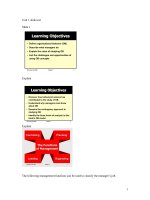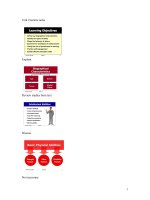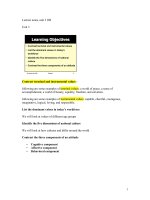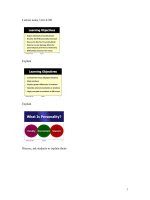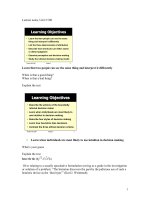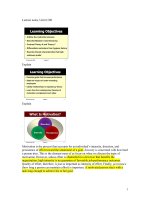Organizational behavior: Lecture 29 - Dr. Mukhtar Ahmed
Bạn đang xem bản rút gọn của tài liệu. Xem và tải ngay bản đầy đủ của tài liệu tại đây (786.66 KB, 53 trang )
Organizational
Behavior
(MGT-502)
Lecture-29
Today’s Topics
Why Do We Study
OB?
Understand
organizational
events
Organizational
Predict
Influence
Behavior
organizational
Research organizational
events
events
People in Organizations
Understanding the basic nature of the
individual-organization interface helps us
appreciate the nature of individual
differences. These differences, in turn, play
a critical role in determining various
important workplace behaviors of special
relevance to managers.
Individual Vs Group
Behavior
Individual Differences
• Individual Differences
– Personal attributes that vary from one
person to another.
– Individual differences include
personality, attitudes, perception, and
creativity.
Understanding
the Basics of
Human Behavior
Heredity
Environment
Individual
Differences
Framework
Abilities
and Skills
Values
Work-Related
Attitudes
Work-Related
Behaviors
Variables Influencing
Individual Behavior
The Person
• Skills & abilities
• Personality
• Perceptions
• Attitudes
•Values
• Ethics
The Environment
• Organization
• Work group
• Job
• Personal life
Behavior
B = f(P,E)
Types of work-related
behaviour
Joining the
organisation
Exhibiting
organisational
citizenship
Performing
required
tasks
Types of
work-related
behaviour
Remaining
with the
organisation
Maintaining
work
attendance
The Person-Job Fit
• Person-Job Fit
–The extent to which the
contributions made by the individual
match the inducements offered by
the organization.
Ability
Mental and physical
capabilities to perform
various tasks.
The Importance of Values
Behavior
Motivation
Perceptions
Attitudes
Values
Values, Loyalty, and Ethical
Behavior
Ethical Values and
Behaviors of Leaders
Ethical Climate in
the Organization
Components of
Attitudes
• Cognitive -- thinking
• Affective -- feeling
• Behavioral -- doing
Types of Attitudes
• Job satisfaction
• Job involvement
• Organizational
commitment
Personality
Mean how people affect others and how
they understand and view themselves,
as well as their pattern of inner and
outer measurable traits and
Person-situation interaction
Locus of Control
Locus of Control - personality
variable that affects individual
behavior
Internal - belief in personal control and
personal responsibility
External - belief in control by outside
forces (fate, chance, other people)
Because personality
characteristics create the
parameters for people’s
behavior, they give us a
frame work for predicting
behavior.
Emotions
and Mood
Facial Expressions Convey
Emotions
Individual BehaviorPerception
• What is Perception?
– A process by which individuals organize
and interpret their sensory impressions in
order to give meaning to their
environment.
• Why Is it Important?
– Because people’s behavior is based on
their perception of what reality is, not on
reality itself.
– The world that is perceived is the world
that is behaviorally important.

